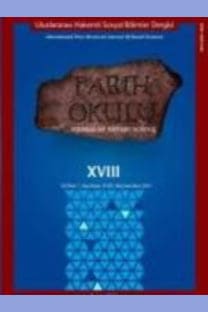GEÇİCİ KORUMA ALTINDAKİ SURİYELİ ÖĞRENCİLERLE BİRLİKTE EĞİTİM ALAN TÜRK ÖĞRENCİLERİN GÖRÜŞLERİNİN DEĞERLENDİRİLMESİ
Evaluation of the Opinions of Turkish Students who are Co-Educated with Temporary Protected Syrian Students
___
- Aksoy, Z. (2012). Uluslararası göç ve kültürlerarası iletişim. Journal of International Social Research. 5(20). Birleşmiş Milletler Mülteciler Yüksek Komiserliği, 2017a. Ocak 2017 itibariyle UNHCR Türkiye istatistikleri. http://www.unhcr.org/turkey/uploads/root/tr(66).pdf (Erişim Tarihi: 19.06. 2017).
- Börü, N. ve Boyacı, A. (2016). Göçmen öğrencilerin eğitim-öğretim ortamlarında karşılaştıkları sorunlar: Eskişehir ili örneği. Turkish Studies, 11(4): 123-158.
- Creswell, J. W. (2013). Research design: Qualitative, quantitative and mixed methods approaches. Los Angeles: Sage Publications.
- Deniz, T. (2014). Uluslararası göç sorunu perspektifinden Türkiye. Türkiye Sosyal Araştırmalar Dergisi, 18(1): 175-204.
- Duruel, M. (2016). Suriyeli sığınmacıların eğitim sorunu. Atatürk Üniversitesi İktisadi ve İdari Bilimler Dergisi, 30(5): 1399-1414.
- Erdem, c. (2017). Sınıfında mülteci öğrenci bulunan sınıf öğretmenlerinin yaşadıkları öğretimsel sorunlar ve çözüme dair önerileri. Medeniyet Eğitim Araştırmaları Dergisi, 1(1): 26-42.
- Göç İdaresi Genel Müdürlüğü, 2017. Geçici korumamız altındaki Suriyeliler. http://www.goc.gov.tr/icerik3/gecici-korumamiz-altindakisuriyeliler_ 409_558_560 (Erişim Tarihi: 19.06.2017)
- Güngör, F. (2015). Yabancı uyruklu ilkokul öğrencilerinin eğitimöğretiminde yaşanan sorunlara ilişkin öğretmen ve öğrenci görüşleri. (Yayımlanmamış Yüksek lisans Tezi). Anadolu Üniversitesi Eğitim Bilimleri Enstitüsü, Eskişehir.
- Kılınç, E. (2014). Antalya’da Yaşayan Yabancı Uyruklu Aile Çocuklarının Karşılaştığı Eğitim Sorunları (Uluslararası Özel Antalya Rus Okulu Örneği). (Yayınlanmamış Yüksek lisans Tezi). Akdeniz Üniversitesi Eğitim Bilimleri Enstitüsü, Antalya.
- Özdemir, S.M, Benzer, H. ve Akbaş, O. (2009). Almanya'da yaşayan 15- 19 yaş Türk gençlerinin eğitim sorunlarına ilişkin bir inceleme (Kuzey Ren Vestfalya Örneği). Ahi Evran Üniversitesi Kırşehir Eğitim Fakültesi Dergisi (KEFAD), 10(1): 23-40
- Özer, Y.Y., Komşuoğlu, A. ve Ateşok, Z. (2016). Türkiye’deki Suriyeli çocukların eğitimi: sorunlar ve çözüm önerileri. Akademik Sosyal Araştırmalar Dergisi, 4(37): 76-110.
- Patton, M. Q. (2002). Qualitative research and evaluation methods. Sage Publications: Thousand Oaks.
- Polat, F. (2012). Türkiye’de Öğrenim Gören Yabancı Uyruklu İlköğretim Öğrencilerinin Karşılaştıkları Sorunlar ve Çözüm Önerileri. (Yayınlanmamış Yüksek lisans Tezi). Fırat Üniversitesi Sosyal Bilimler Enstitüsü, Elazığ.
- Sandal, E. K., Hançerkıran, M. ve Tıraş, M. (2016). Türkiye’deki Suriyeli mülteciler ve Gaziantep ilindeki yansımaları. Gaziantep University Journal of Social Sciences, 15(2): 461-483.
- Sarıtaş, E., Şahin, Ü. ve Çatalbaş, G. (2016). İlkokullarda yabancı uyruklu öğrencilerle karşılaşılan sorunlar. Pamukkale Üniversitesi Sosyal Bilimler Enstitüsü Dergisi, 25(1): 208-229.
- Taneri, A. ve Tangülü, Z. (2017). İlkokul 4. sınıf öğrencilerinin sığınmacılara bakış açılarının incelenmesi. Adıyaman Üniversitesi Sosyal Bilimler Enstitüsü Dergisi, 9(25): 187-214.
- Tanrıöğen, A. (2009). Bilimsel araştırma yöntemleri. Ankara: Seçkin.
- Uluocak, G.P. (2009). İç göç yaşamış ve yaşamamış çocukların okulda uyumu. Dokuz Eylül Üniversitesi Buca Eğitim Fakültesi Dergisi, 26: 35-44.
- Uzun, E. M. ve Bütün, E. (2016). Okul öncesi eğitim kurumlarındaki Suriyeli sığınmacı çocukların karşılaştıkları sorunlar hakkında öğretmen görüşleri. Uluslararası Erken Çocukluk Eğitimi Çalışmaları Dergisi, 1(1): 72- 83.
- Yıldırım, A. ve Şimşek, H. (2012). Sosyal bilimlerde nitel araştırma yöntemleri. Ankara: Seçkin.
- https://www.unicefturk.org/suriye/Suriyeli_Cocuklar_UNICEF_Bilgi_Do kumani10_09_2015%201835-TR.pdf. (Erişim Tarihi: 03.12.2015).
- http://gocvakfi.org/bm-multeciler-yuksek-komiserligi-kuresel-egilimlerraporu- 2016/ (Erişim Tarihi: 01.04.2017).
- ISSN: 1308-5298
- Yayın Aralığı: 6
- Başlangıç: 2008
- Yayıncı: Ahmet KARA
HELLEN POLİSLERİNİN TOPOGRAFİK TASNİFİ
YAŞLI BİREYLERİN BESLENME VE DİYET KONUSUNDAKİ TUTUMLARI
CUMHURİYET İDARESİNE GEÇİŞ SÜRECİNDE SİİRT’TE DEMOGRAFİK GÖSTERGELER
Resul BABAOĞLU, Abdurrezzak ÇELİK
18. YÜZYILDA HISN-I MANSUR KAZASINDA (ADIYAMAN) CAMİLER ve CAMİ GÖREVLİLERİ
ATATÜRK’ÜN ORTADOĞU POLİTİKASI
KIRGIZİSTAN RESMİ HABER AJANSI ‘KABAR’DA TÜRKİYE’NİN TEMSİLİ
THE EXPERIENCE OF PROBATION IN TURKEY: CRIMINOGENIC NEEDS AND EXPECTATIONS OF PROBATIONERS
CİHAN ERTAN, MERAL TİMURTURKAN, GÖNÜL DEMEZ, ELİFE KART
INVESTIGATION OF CHARACTERISTIC FEATURES OF COACHES ACCORDING TO SOME VARIABLES
ALMANYA’DA SACHUNTERRICHT (HAYAT BİLGİSİ) DERS KİTAPLARINDA BİR ARADA YAŞAM KÜLTÜRÜNÜN SUNUMU
